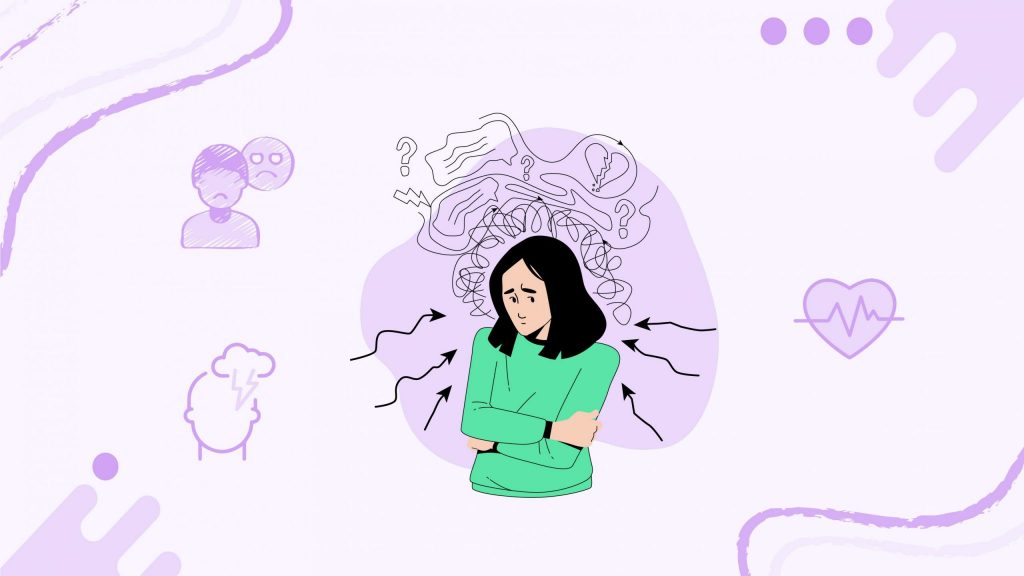“An unknown fear taking over, as the sea of faces grew; shadowed thoughts, lurking behind the mask, looking for a hint or a clue.”
Your friends have dragged you to a party, but you don’t feel like you belong there. You are carefully trying not to make eye contact with anyone so you don’t have to talk.
After a while, it feels suffocating, and you just want to get out of there. You are too afraid to attend such events or socialize with anyone.
You get nervous when somebody tries to have a conversation with you, making your heart race and sweating your forehead and palms.
If this is you, in all of the social events, then you are suffering from social anxiety.
It might not be as huge as it might seem if it is not managed properly. However, with proper techniques and constant efforts, you can beat your social anxiety and become a confident and charismatic person.
Let’s learn more about social anxiety, its science, and the techniques that can help you boost your social confidence.
What Is Social Anxiety and How Does It Affect You?
Have you ever wondered why even small conversations make your heart race and palm sweat? When you step into a room full of people, does it feel like you are being judged from every angle?
If it’s true, you must understand why it happens and the science behind it to develop highly effective techniques that make you confident and more engaged in a conversation rather than running away from it.
Social anxiety is not just when you feel shy or nervous in social situations. It is more about the constant and overwhelming fear that comes every time you are around people, which makes even a small interaction challenging.
Your brain makes you think you are being judged, keeping you in self-doubt and avoiding social gatherings completely. You may have symptoms of discomfort like racing thoughts, sweaty palms, or a pounding heart.
However, you must understand that you are not alone in this journey; many people are going through the same and constantly making efforts to get out of this cycle with the help of the right approach and mindset.
👉 Pro Tip
When you feel anxious, shift your focus from yourself to the other person in the conversation. This small change can reduce self-consciousness and help you engage more naturally, easing the pressure of social interactions.
Research shows that 7.1% of the population has social anxiety disorder at some point in their lives, which means you are not as isolated as you may think. There’s a wide spectrum of social anxiety, and it affects people differently, but the common thread is the deep-seated fear of negative evaluation by others.
The Science of Social Anxiety
Talking about social anxiety is not always about the mental or emotional experience; it is deeply rooted in your brain’s neural pathways, especially in areas responsible for fear and the body’s “fight or flight” response.
The amygdala controls your brain’s emotional response, and it becomes overactive when you face social anxiety or perceive a social interaction as a potential threat, even when there is no real danger. It will trigger a defensive response, making you anxious and finding these social situations difficult to face.
Social anxiety can be more challenging when it is not just about you feeling nervous but has a biological basis. Neurotransmitters, such as serotonin and dopamine, are responsible for regulating your emotions and mood. When these chemicals are out of balance, you may feel anxiety, even before the beginning of a social event.
👉 Interesting Fact
Social anxiety often activates the same brain regions as physical pain, which is why social rejection or judgment can feel almost as uncomfortable as getting hurt physically!
According to some research, up to 13% of individuals experience social anxiety disorder at some point in their lives, highlighting how widespread this condition is. It makes it essential to understand the science behind it to help you better manage and work through your anxiety.
Build Your Social Confidence With Effective Techniques
It is not impossible to build your social confidence; all it takes is your constant effort and the use of practical techniques.
Here are some of the effective techniques to overcome social anxiety and build long-term confidence:
#1: Start Small and Gradually Build Up
If you are looking for long-term improvement in your social anxiety, you must start by taking small yet effective steps to increase your confidence gradually. For that, you can attend small, low-pressure social situations and slowly move ahead with the challenging ones.
The best way to overcome social anxiety is to be consistent with your efforts and avoid pushing yourself too much; otherwise, it can trigger overwhelming feelings of anxiety. On the other hand, taking small steps helps you become more comfortable over time.
#2: Challenge Your Negative Thoughts
If negative thoughts consistently surround you, it can fuel your social anxiety. And, whenever there are people around you if you keep thinking, “They will judge me” or “I am going to mess this up,” you are encouraging your fears.
As per the Cognitive-behavioral therapy (CBT), you can reframe them by identifying and challenging these thoughts. You can ask yourself, “What’s the worst that could happen?” or “Is this thought really based on facts?” you can also keep a journal to analyze your thoughts and prepare a better solution for your social fear.
#3: Focus on What You Can Control
Not everything is in your hands, and there are certain situations that you cannot control, such as how other people react to you. However, you can control your actions and how you react to situations with the right mindset. You can shift your focus to what you can control, such as preparing for social situations and practicing self-compassion.
Studies have shown that individuals who engage in mindfulness techniques, like deep breathing and meditation, report lower levels of social anxiety.
#4: Practice Assertive Communication
Assertive communication can be helpful when it comes to boosting your social confidence. It involves expressing your needs and desires clearly and respectfully. It might also mean practicing saying “No” when you feel uncomfortable or speaking up for yourself or when you have something to say.
Strong communication during a conversation will make you feel less anxious about other people’s perceptions.
#5: Surround Yourself With Supportive People
The people you are surrounded by play an important role when it comes to managing your anxiety. It is important to have people around you who understand and support you in social situations. Even having just one close friend can make a huge difference.
Quick Question
When was the last time you pushed yourself to step into a social situation you were nervous about? How did it feel, and what small step could you take next time to feel more in control?
According to research, people with solid support systems are more likely to overcome social anxiety because they feel less isolated.
Conclusion
Getting out of your comfort zone and being socially confident is a life-changing journey you can achieve with your constant efforts and effective techniques. It is important to understand that your social anxiety does not reflect who you are as a person but only a challenge that you face.
To overcome your social anxiety, you must understand the science behind it and work on effective techniques to overcome it. You can start by slowly building your social confidence in the long term.
Consistent practice with small steps is the key to successfully becoming a confident and good communicator among people, leading a happy and peaceful life.
Don’t let your social anxiety rule your life; you are powerful enough to change how you feel, and you can take one step at a time.
“Cheerfulness spreading around, keeping the negativity away; openly sharing shadowed thoughts, that once were hard to convey.”
Mindful Practice: Overcoming Social Anxiety
Set Your Intention:
Close your eyes, breathe deeply, and visualize yourself feeling calm in a social setting.
Choose a Small Step:
Pick a simple social interaction you’ve been avoiding. Write it down and commit to it.
Challenge Negative Thoughts:
Notice any fears, write them down, and ask, “Is this really true?” Reframe them positively.
Breathe and Be Present:
Focus on your breath during the interaction to stay calm and grounded.
Reflect and Celebrate:
Afterward, reflect on how it went and celebrate your progress, no matter how small.





















